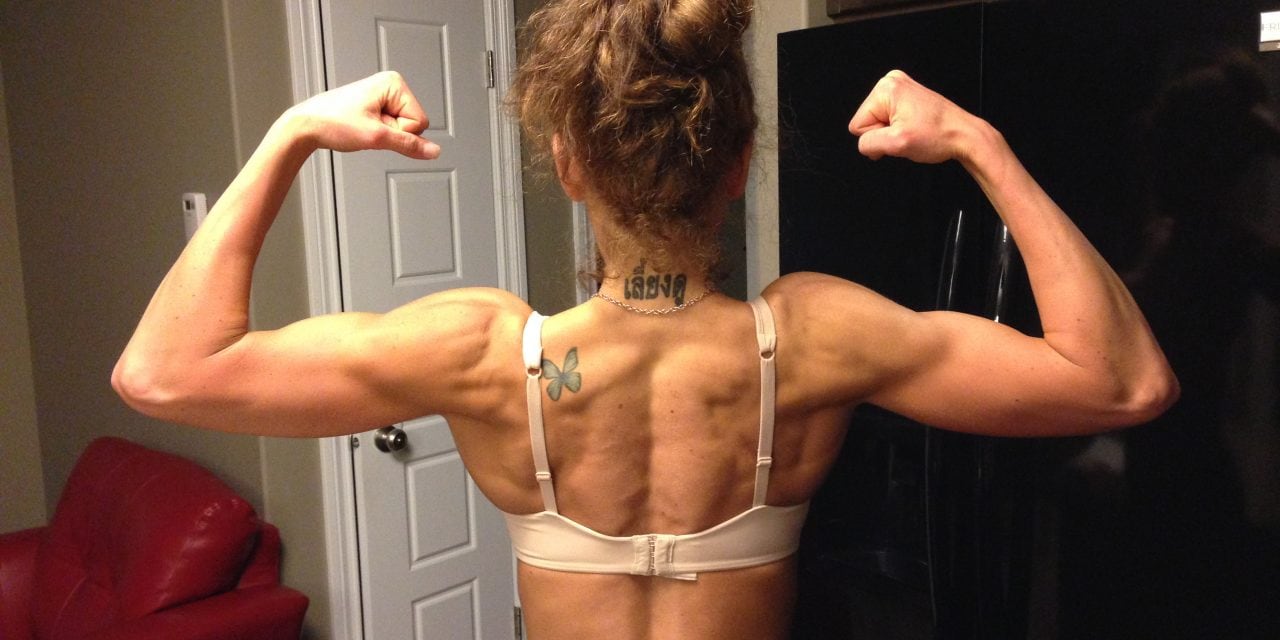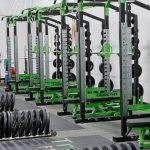Nearly all of us have heard of the Female Athlete Triad, and if you haven’t, I’ll give you the shortest possible synopsis of the problem. Women athletes who train too much, eat too little, and carry too little body fat, stop menstruating, do not produce enough estrogen, and start to lose bone mass. As a result, women are often warned that if we get too lean, we’ll stop menstruating and become infertile. Heck, I wrote a giant paper in my undergraduate studies based on this topic.
I was interested in the issue mostly because I had very irregular periods and went through quite a few episodes of amenorrhea in my teens and most recently in my mid – twenties. Prior to beginning my career in the world of bodybuilding I had very regular periods. I began my WNBF pro tour November of 2013 – I lost my period in December 2014, and did not get it back until August of 2015. Doctors and specialists said that low body fat was to blame for the cessation of regular menstrual cycles. Well, while I wasn’t fat, I definitely wasn’t sporting a shredded low body fat physique that early into my prep.
It turns out there may indeed be more to the story than simply being too lean. It’s not just the amount of fat mass that alters ovulation and your menstrual cycle. In fact, hypothalamic amenorrhea, what we women athletes tend to develop when we stop having our cycles (and what basically means you aren’t having a cycle and nobody knows why), is a real mind-f*** for researchers and scientist. We just don’t have it all figured out yet.
But, what we do know is that absolute energy balance is actually much more important in the maintenance of regular hormone production, ovulation, and menstruation than body fat percentage. In fact, it’s pretty easy to dissociate body fat levels and reproductive function, as normal cycles have been shown to “return in some female athletes when energy expenditure is reduced such as after an injury long before there is any change in body weight or an increase in body fate change in body weight recovery.”
So, if it’s not simply low body fat that causes amenorrhea, what is it? The answer seems to be complex and not fully understood, but I’m going to do my best to make this easy to understand.
Issue #1: Body Weight Not Body Fat
First, body weight seems to have a bigger impact on menstrual cycles than body fat. Falling below 85-90% of ideal body weight, no matter what body fat level, usually results in amenorrhea. I think this has much to do with the issues I personally had as a younger woman. I wasn’t too lean; I was just trying to be too little. But remember, ideal body weight is going to vary quite a bit from woman to woman. My set point is around 135lbs and if I drift below 125lbs I start noticing a lot of problems and irregularities with my cycle. For some women of the same height, 125lbs would be a perfectly health weight to maintain and their cycles would be fine. It’s all about your body and your ideal weight (health-wise, that is).
Issue #2: When Workouts Stop Working
 How hard we are “working at our fitness” has quite a large part in determining how well our girl stuff is working. If we are working out in a healthy way and expend more energy than we are eating, we lose weight. This doesn’t cause menstrual issues for most women.However, for the more type A, hard-hitting athletes who tend to take their diets and workouts to extremes, this lifestyle can definitely have an effect on menstrual cycles.
How hard we are “working at our fitness” has quite a large part in determining how well our girl stuff is working. If we are working out in a healthy way and expend more energy than we are eating, we lose weight. This doesn’t cause menstrual issues for most women.However, for the more type A, hard-hitting athletes who tend to take their diets and workouts to extremes, this lifestyle can definitely have an effect on menstrual cycles.
If we are pushing ourselves to the max with two-a-days, super long workouts, and crazy metcons, while also eating very little in an attempt to lose body fat, then we run into problems.If the difference between intake and output is too great, it throws the body for a loop. This increases our production of cortisol and other stress hormones, which in turn decrease gonadotropin releasing hormone (GnRH) release from the hypothalamus. This results in low levels of follicle stimulating hormone (FSH) and leutinizing hormone (LH), which in turn causes anovulation; low estrogen, testosterone, and progesterone levels; and – NO PERIOD.
Issue #3: Low Leptin Levels
Leptin levels also have an effect on menstruation. Leptin is a protein produced by adipose cells that acts as a hormone on the reproductive axis. It is also the hormone responsible for making you feel full or satiated. Leptin is commonly thought to be positively correlated with body fat levels (i.e. leptin goes up as fat mass goes up), but lower leptin levels have been found in bulimics and anorexics who were exercising and/or had lower caloric intake than anorexics or bulimics of the same weight. So, your level of leptin seems to not be specifically tied to body fat levels but on overall energy availability. And when leptin is low, so is GnRH and LH, and this makes ovulation and regular menstruation less likely.
Here is an illustration of the mechanisms in the menstrual cycle. You can see how GnRH, FSH, and LH are all essential in the initial (follicular) phase. So if they are low, things have to go haywire.

The Answer?
While there are many other hormones and outside factors that can cause menstrual irregularities in female athletes, I think it’s safe to say that it’s not simply body fat levels or workouts that make your cycle go crazy. Amenorrhea in athletic women is more related to overall energy balance. If you’re having irregular cycles, you need to ask yourself:
- Are you are eating enough to support your activity level?
- Are you trying to lose body fat by ramping up your workouts and cutting way back on your caloric intake?
If your doing these things, you are basically shooting yourself in the foot and you can expect your periods to go bonkers. Also, you should know that your metabolism, thyroid, growth hormone, and testosterone production will also slow to a standstill. Irregular cycles, stalled progress in the gym, and stagnant weight loss despite enormous efforts are your body’s cry for help and rest. The answer is not to push through or to “suck it up.” The answer is to back off. That’s a really tough thing to do if you’re the type of person who expects a lot of herself. But, trust me, don’t waste months or even years fighting your body. It will win. It’s smarter than you. The more slowly you lose body fat, the more muscle you carry and the closer you stay to your body’s ideal body weight, and the more moderate you are with changes to your calories, the more regular your cycles will be and the more happy, cooperative, and responsive your body will be to your training.
Now that I am into my second trimester of my first pregnancy I am at a crux. As of right now I do not foresee any contest prep diet’s on my radar. I will never say never but at this time its not something I am itching to accomplish. It took a lot of mental and physical work to get my body back into working order and I am not sure if I will ever be at a point where I want to compromise that ever again.
This is not to deter competitors from competing in bodybuilding / fitness competitions. If anything it is a solace for women whom may be experiencing irregular periods or the ‘not so glamorous’ ‘not as talked about’ side of diet and exercise.
Stay tuned for more ‘From Chasing the Stage to Chasing Baby’ blog posts, as I share the ins and outs of this awkward yet magical period in a woman’s life.
With Love From The Trench Kitchen.
xoxoErika
Refrences
- Lutter JM, Cushman S: Menstrual patterns in female runners. Physician Sportsmed. 10(9): 60-72, 1982.
- Sandborn CF, Martin BJ, Wagner WW: Is athletic amenorrhea specific to runners? Am J Obstet Gynecol 143:859-861, 1982.
- Drinkwater B, Johnson M, Loucks A, et al: The female athlete triad. Med Sci Sports Exerc 29: 1-16, 1997.
- Drummer GM, Rosen LW, Heusner WW, et al: Pathogenic weight-control behaviors of young competitive swimmers. Phys Sportsmed 15(5): 75-86, 1987.
- Smith A: The female athlete triad: causes, diagnosis and treatment. Phys Sportsmed 24:1-9, 1997.
- Rosen LW, Hough DO: Pathogenic weight-control behaviors of female college gymnasts. Physician Sportsmed 16(9):140-6, 1988.










